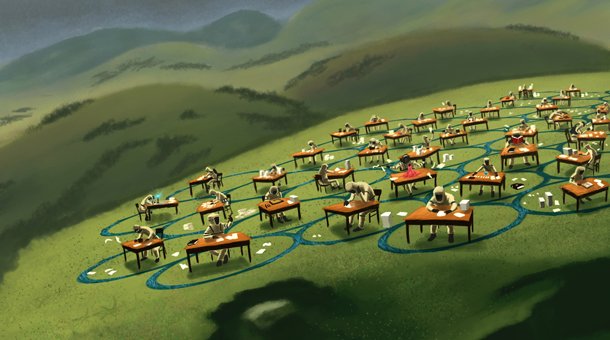Black Crown tells an interactive tale of tragic love and microtransactions

"So it's an exploratory tragic love story crossed with a narrative second person dystopic bureaucracy sim."
I am trying to explain Random House and Failbetter Games' collaboration, Black Crown - a narrative second person dystopic bureaucracy sim crossed with an exploratory tragic love story.
The project began life as a piece of experimental fiction by creative writing student, Rob Sherman, which involved sending his tutor a suitcase full of journals, ephemera and objects picked up in a junk shop and telling him that by perusing the contents to piece together the narrative he was being infected by a peculiar (and plot-relevant) disease.
Upon establishing that said tutor was not, infact, about to succumb to a physically debilitating illness, Sherman found himself recommended to Random House as an author of interest. Under the guidance of digital publisher, Dan Franklin the suitcase was transformed into Black Crown - a non-linear digital project, part game, part experimental storytelling, part testing ground for new publishing business models.
You play as an office clerk, newly recruited by the mysterious Widsith Institute. Your work includes analysing and categorising documents as part of the Institute's digitisation process but, over the course of your employment, the material begins to unfurl into a story of exploration, love and tragedy.

Business-wise, it's a free-to-play affair aimed at readers from the Young Adult bracket onwards (around 14 years old and above) and its profitability hinges around microtransactions which expedite or expand the narrative.
One type of microtransaction involves an energy system which echoes Farmville - progress or promotion will require you to wait a certain length of time but that time limit can be overridden by paying a small fee. Another type offers players the chance to unlock extra story options and content as they move through the narrative.
The biggest gaming news, reviews and hardware deals
Keep up to date with the most important stories and the best deals, as picked by the PC Gamer team.
"Those, we've found, work disproportionately well in our other projects," says Failbetter's Alexis Kennedy of the additional content option. "People feel they're getting something specific and measurable [...] They'd like to make a choice that means they've got more of an emotional connection to finding out what's behind that paywall."
In terms of potential cost, Kennedy and Franklin tentatively offer £10 as a maximum payment if you choose to take every single paid option in the game as it currently stands, but they expect the average reader or player to pay much less than that. Given many free-to-play games operate with no theoretical maximum cost (much to the chagrin of some parents), I ask whether the business model can possibly be profitable.
"I can't go into the specifics but we've modelled it on Alexis's experiences with Fallen London [a previous Failbetter project which uses the same StoryNexus platform]," explains Franklin. "Our key performance indicators are around returning audience and average revenue per user. We're looking at a situation where, coming to the end of the preliminary four months, we're starting to go into profit."

So is it any good from a gaming point of view? It's an interesting question and possibly not quite the right one given the experience could also be labelled as narrative collage. From a limited hands-on session, the game has a peculiarly retro feel: the result of the click-to-advance interface and the purposely institutionalised aesthetic. Interacting with the multimedia aspects could also feel unwieldy, necessitating you leave the main screen to examine pictures or objects.
The narrative alternates between explicitly telling you how your character is feeling and asking you for your responses to events. It's a deliberate reference to the traditions of interactive storytelling but the tensions created when an author has to project a character onto a player but give said player enough room to respond in a personal way are sometimes jarring. That said, Sherman's talent for evocative phrasing and detail definitely made an impression - "The ink has made cathedral glass of its enclosure," was his description of a broken red biro on the floor.
The project is a living work whose scope and volume of content will increase over the months. The team will also be able to make use of metrics and feedback to refine and tweak the models and structure, learning what works and what doesn't. It will be particularly interesting to see how the microtransaction options play out and whether the energy expenditure system causes players to bounce off or whether it serves more as an approximation of a particular reading experience - collections of snatched minutes on the tube, before bed or on the loo.
"It would, however, be a mistake for you to consider this a quest, and yourself a knight," explains one curious line of dialogue. "Yours is the realm of the woodlouse, the gradual illumination of things." It's a sentiment which holds as true for Random House's experimentation with new formats as it does for the narrative itself.

